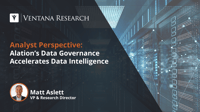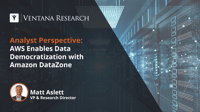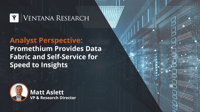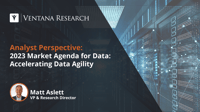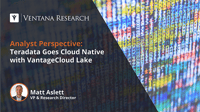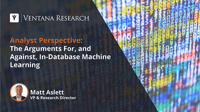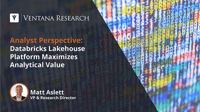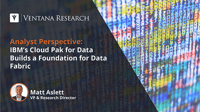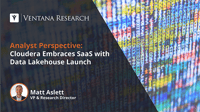As data continues to grow and evolve, organizations seek better tools and technologies to employ data faster and more efficiently. Finding and managing data remains a perennial challenge for most organizations, and is exacerbated by increasing volumes of data and an expanding array of data formats. At the same time, organizations must comply with a growing list of national and regional rules and regulations, such as General Data Protection Regulation and the California Consumer Privacy Act....
Read More
Topics:
Data Governance,
Data Management,
Data,
data operations
I have previously written about the importance of data democratization as a key element of a data-driven agenda. Removing barriers that prevent or delay users from gaining access to data enables it to be treated as a product that is generated and consumed, either internally by employees or externally by partners and customers. This is particularly important for organizations adopting the data mesh approach to data ownership, access and governance. Data mesh is an organizational and cultural...
Read More
Topics:
Cloud Computing,
Data Governance,
Data Management,
Data,
Digital Technology,
data operations,
Analytics & Data
The market for data and analytics products is constantly evolving, with the emergence of new approaches to data persistence, data processing and analytics. This enables organizations to constantly adapt data analytics architecture in response to emerging functional capabilities and business requirements. It can, however, also be a challenge. Investments in data platforms cannot be constantly written-off as organizations adopt new products for new approaches. Too little change can lead to...
Read More
Topics:
Data Governance,
Data Management,
Data,
data operations
Organizations across various industries collect multiple types of data from disparate systems to answer key business questions and deliver personalized experiences for customers. The expanding volume of data increases complexity, and data management becomes a challenge if the process is manual and rules-based. There can be numerous siloed, incomplete and outdated data sources that result in inaccurate results. Organizations must also deal with concurrent errors – from customers to products to...
Read More
Topics:
Data Governance,
Data Management,
Data,
data operations,
analytic data platforms
Ventana Research recently announced its 2023 Market Agenda for Data, continuing the guidance we have offered for two decades to help organizations derive optimal value and improve business outcomes.
Read More
Topics:
Cloud Computing,
Data Governance,
Data Management,
Data,
Digital Technology,
data operations,
Analytics & Data,
Streaming Data & Events,
analytic data platforms,
Operational Data Platforms
Organizations are increasingly utilizing cloud object storage as the foundation for analytic initiatives. There are multiple advantages to this approach, not least of which is enabling organizations to keep higher volumes of data relatively inexpensively, increasing the amount of data queried in analytics initiatives. I assert that by 2024, 6 in ten organizations will use cloud-based technology as the primary analytics data platform, making it easier to adopt and scale operations as necessary.
Read More
Topics:
Teradata,
Data Governance,
Data Management,
Data,
analytic data platforms,
operational data plaftforms,
Object storage,
vantage platforms
Almost all organizations are investing in data science, or planning to, as they seek to encourage experimentation and exploration to identify new business challenges and opportunities as part of the drive toward creating a more data-driven culture. My colleague, David Menninger, has written about how organizations using artificial intelligence and machine learning (AI/ML) report gaining competitive advantage, improving customer experiences, responding faster to opportunities and threats, and...
Read More
Topics:
Data Governance,
Data Management,
Data,
data operations,
AI & Machine Learning,
Analytics & Data,
analytic data platforms
I have previously written about growing interest in the data lakehouse as one of the design patterns for delivering hydroanalytics analysis of data in a data lake. Many organizations have invested in data lakes as a relatively inexpensive way of storing large volumes of data from multiple enterprise applications and workloads, especially semi- and unstructured data that is unsuitable for storing and processing in a data warehouse. However, early data lake projects lacked structured data...
Read More
Topics:
Business Intelligence,
Data Governance,
Data Management,
Data,
AI & Machine Learning,
Streaming Data & Events,
analytic data platforms
I have written recently about the similarities and differences between data mesh and data fabric. The two are potentially complementary. Data mesh is an organizational and cultural approach to data ownership, access and governance. Data fabric is a technical approach to automating data management and data governance in a distributed architecture. There are various definitions of data fabric, but key elements include a data catalog for metadata-driven data governance and self-service, agile data...
Read More
Topics:
business intelligence,
Cloud Computing,
Data Governance,
Data Management,
Data,
data operations,
AI & Machine Learning,
operational data plaftforms
Ventana Research’s Data Lakes Dynamics Insights research illustrates that while data lakes are fulfilling their promise of enabling organizations to economically store and process large volumes of raw data, data lake environments continue to evolve. Data lakes were initially based primarily on Apache Hadoop deployed on-premises but are now increasingly based on cloud object storage. Adopters are also shifting from data lakes based on homegrown scripts and code to open standards and open...
Read More
Topics:
Business Intelligence,
Cloud Computing,
Data Governance,
Data Management,
Data,
data operations,
AI & Machine Learning,
Analytics & Data,
analytic data platforms,
Operational Data Platforms
